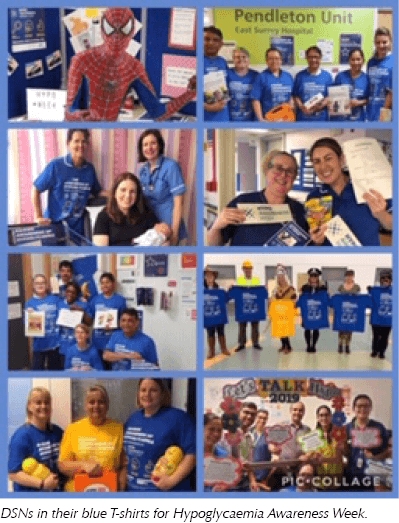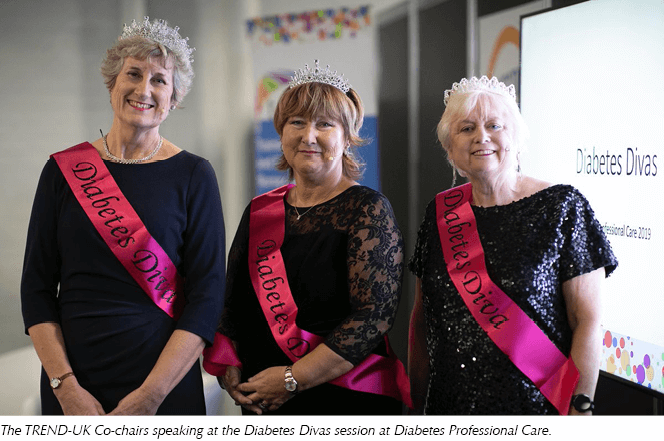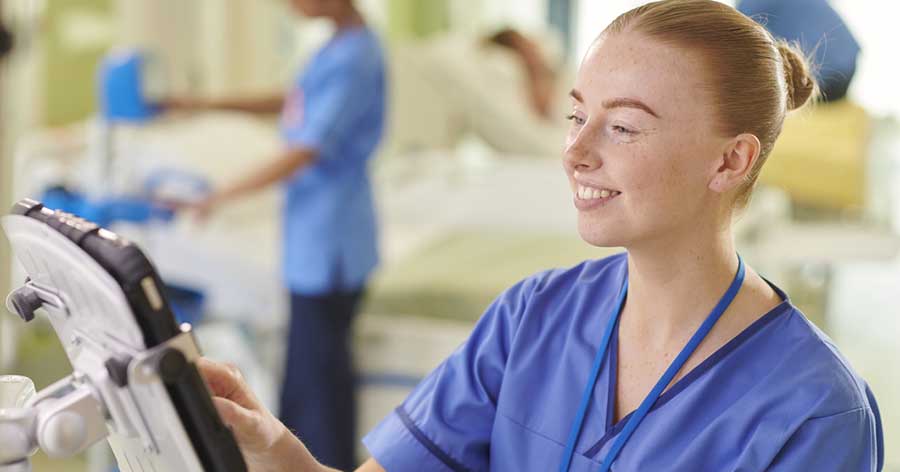I presented at a conference for The Christie Hospital (a specialist cancer hospital and research centre) about hyperglycaemia, those at risk, and its impact and risk assessment. Being alongside some international oncologists was pretty daunting but it was a great opportunity to raise the profile of diabetes and hyperglycaemia in oncology from a specialist nursing perspective. I continue to be inspired and challenged daily by those with cancer and diabetes/diabetes and cancer.
On to October, and the first week kicked off with Hypoglycaemia Awareness Week. The DSN Forum Facebook page was bursting with hypoglycaemia brilliance, including the avoidance of neonatal hypoglycaemia and colostrum harvesting. Teams were talking, walking, dancing, playing and singing about hypoglycaemia, and a sea of blue T-shirts filled Twitter and Facebook with all of the aforementioned, as well as displays of literature and information, frivolity and fun. It was great to see DSNs embracing the week and striving to make an impact to change attitudes and standards of care in the way DSNs do best.
NHS England will continue to have Partha Kar and Jonathan Valabhji at the helm for diabetes care, which no doubt will be a relief to the diabetes community for whom this duo have achieved so much. Professor Valabhji will continue as the National Clinical Director for Obesity and Diabetes, while Professor Kar will receive the new title of National Specialty Advisor, with a specific focus on type 1 diabetes and technology.
Disappointment in latest NPID
The 2018 National Pregnancy in Diabetes (NPID) Audit findings were published this month and, sadly, statistics continue to reflect that women with diabetes are not adequately prepared for a pregnancy, and there continues to be higher rates of stillbirth, adverse neonatal outcomes and congenital abnormalities – no improvement in the last 5 years. The St Vincent Declaration was published in 1989, and 30 years later there remains much to debate on this subject – maybe one to readdress within teams, paediatric clinics, and young people and transition clinics?
Treatment developments
A new oral capsule under development in the US, containing dissolvable needles that inject insulin into the lining of the bowel, made the press – The Times, actually! However, the general air about the innovation seems to be one of caution and “thanks but no thanks!”
Abbott and Tandem have announced they are working together to combine their flash glucose monitoring and insulin pump systems, which will hopefully bring us yet more tech and more options.
Language matters
There has sadly been some unprofessional and unnecessary tweets, cartoons and TV remarks about obesity, type 2 diabetes complications, lifestyle and diabetes management choices. In one TV faux pas, Paul Hollywood commented on The Great British Bake Off about a particular dessert and likened it to “diabetes on a plate.” Twitter responded and berated, the matter was debated and Mr Hollywood apologised. A blog from one of the most respected diabetes advocates and the most level-headed of chaps, Adrian Long, gave an excellent perspective.
Chris Askew, of Diabetes UK, also responded admirably to the responses to an image informing us of the number of lower limb amputations resulting from diabetes complications.
As Adrian stated, responses to what is often an error of judgment can be extreme. However, we do get to witness how people feel, the rights and wrongs of language and information related to diabetes are clearly demonstrated, and voices from those with diabetes are heard. It was heartening also to see apologies and responses, and a recognition that people have opinions and feelings.
It is great to see the community of healthcare professionals and people with diabetes fighting back and highlighting the error of these views and this language. In response, some acknowledge their discriminatory remarks and lack of judgement, while others remain bullying and belligerent. We must continue to challenge and remind each other of the Language Matters document.
Awards, conferences and education
TREND-UK hosted their annual conferences last month in London and Birmingham, and Exeter’s fabulous Monogenic Diabetes Course for 2020 has been published: details here.
The Quality in Care (QiC) awards were also held in October, and the DSN Forum team was privileged to contribute to the judging of the diabetes excellence and was in attendance at the event. The Diabetes Professional of the Year award went to DSN Rachel Berrington for her dedication to people with diabetes and footcare. It’s fantastic that DSNs are achieving great things year on year. Congratulations to all entrants and winners.
As the month drew to a close, the Diabetes Professional Care conference took place and was awash with healthcare professionals from all areas of diabetes care, the conference providing for all disciplines and a fabulous platform for networking. DSNs were very much at the helm of the conference of many sessions and workshops. My favourite picture from Twitter was the TREND-UK ladies, complete with tiaras, sharing over 70 years of diabetes nursing experience in the “Diabetes Divas” session. Their audit of DSN numbers was also published.
Sharing best practice
The DSN Forum continues to be a very busy platform for the sharing of practice and ideas between healthcare professionals to support people with diabetes. Participants have been educating student nurses and new doctors, finding literature in different languages, sharing job adverts, discussing safe and appropriate insulin prescriptions for variable doses, attending conferences, starting degree courses, starting new jobs and finding new ways of teaching. It is so refreshing to see the level of support between the group members.
If you are a specialist healthcare professional directly involved in diabetes care, you can answer the questions and join the closed Facebook page, or you can join us on Twitter and our open Facebook page.

Follow the DSN Forum on:
Twitter
Facebook
Website
YouTube
Instagram






Carefully selected highlights of the recent EASD 2025 meeting.
24 Sep 2025